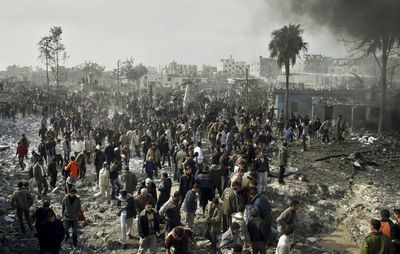Israeli strikes on Gaza kill more than 200
More than 100 sites targeted in deadliest fighting in decades

JERUSALEM – Waves of Israeli airstrikes on security compounds in the Hamas-ruled Gaza Strip killed more than 200 people on Saturday, sending tremors through the Middle East and inflaming the Israeli-Palestinian conflict at a time of transition in Washington.
It was the deadliest day of fighting in Gaza in decades, coming after militants in the coastal territory had stepped up attacks on Israel, firing scores of rockets and mortar rounds after the expiration of a shaky truce last week.
Mu’awiya Hassanein, chief of emergency services in the Gaza Strip, said that 225 people had been killed and 750 wounded in the Israeli attacks, which continued into the night. Gaza militants fired fresh salvos or rockets at southern Israel, killing one man in the town of Netivot and wounding several others.
The surge in violence came at a time of political flux in the U.S. and Israel, underlining the explosive potential of the Arab-Israeli conflict just as President-elect Barack Obama prepares to take office and weeks before Israelis go to the polls for national elections.
Analysts said it was too early to tell whether the deadly eruption could complicate peace efforts by a new U.S. administration, and that much depended on how powerfully the bloody scenes from Gaza would reverberate in the region, where angry street protests erupted in several Arab countries.
Yossi Alpher, an Israeli strategic analyst, said he expected the army action “to return us to some sort of status quo ante: If it succeeds we’re back to some sort of cease-fire, and if it fails we’re back to some sort of tit for tat.”
But Alpher added that “if the regional reaction is much more than anticipated – if for example there’s an escalation in the north and it becomes a two-front war, or if we see jihadist terrorism abroad – then this is the crisis that Joe Biden was talking about (during the U.S. election campaign), that would test the new president much sooner than he thought.”
A spokeswoman for Obama, who is vacationing in Hawaii, said he was closely monitoring events in Gaza, and an aide said the president-elect had discussed the Mideast situation in a phone conversation with Secretary of State Condoleezza Rice.
Rice said in a statement that the U.S. “holds Hamas responsible for breaking the cease-fire and for the renewal of violence in Gaza,” adding that “the cease-fire should be restored immediately.”
The White House also put the onus for the violence on Hamas, and pointedly avoided calling on Israel to halt its military action. “Hamas’ continued rocket attacks on Israel must cease if the violence is to stop,” said White House spokesman Gordon Johndroe, urging Israel “to avoid civilian casualties as it targets Hamas in Gaza.”
The Israeli strikes hit more than 100 targets, the army said, including security compounds and police buildings across the Gaza Strip – some in crowded neighborhoods – leaving scores of dead and injured, mostly uniformed officers but also civilians. Smoke rose over Gaza as explosions shook the city. “It was like an earthquake,” said Ahmed Ghannam, a shopkeeper.
At the main police headquarters in Gaza City, which was hit during a graduation ceremony for new officers, the bodies of more than a dozen men were strewn on the ground next to the wounded. One injured officer raised his index finger, chanting the Muslim affirmation of faith: “There is no God but Allah, and Muhammad is his messenger.” The dead included Gaza’s police commander, Tawfiq Jaber.
There were scenes of pandemonium at Shifa Hospital, which was overwhelmed with casualties, some of whom were treated on the floor and in corridors. Bodies wrapped in blankets were piled near the morgue. A man emerged from the building carrying a dead child, and the body of a girl lay on a stretcher.
Hamas spokesman Fawzi Barhoum called the deaths a “massacre” and “Holocaust,” and vowed fierce retaliation with rockets and suicide bombings.
The Israeli authorities put towns near the Gaza Strip on alert, and sirens warned of incoming rockets as residents took cover in shelters.
Israeli Defense Minister Ehud Barak said the Israeli operation would be “deepened and broadened as much as is necessary.”
“It will not be easy and it will not be short,” Barak added, vowing to “fundamentally change the situation” and halt the attacks from Gaza.
Foreign Minister Tzipi Livni said that “the international community needs to understand that this is the translation of the right of Israel to defend itself, that there is no other alternative, and we are doing what we need to do in order to defend our citizens.”